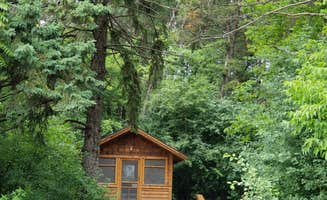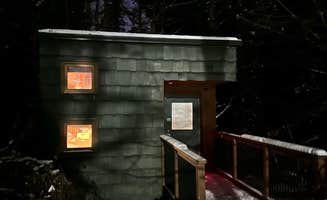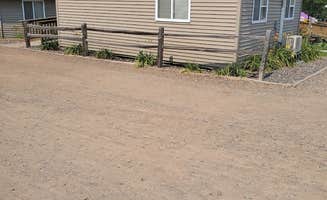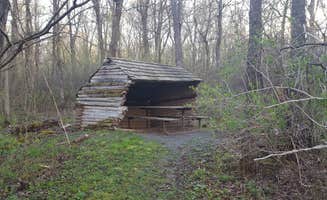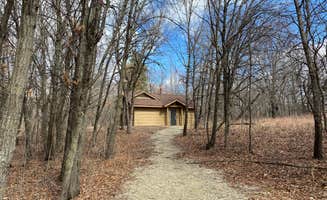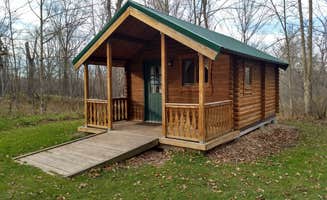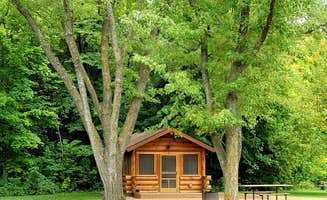Cabin camping near Cottage Grove, Minnesota offers a range of overnight accommodations across several county and state parks within a 30-minute drive. The area sits at the confluence of the Mississippi and St. Croix rivers, with most camper cabins located at elevations between 700-900 feet. Winter cabin camping remains popular despite temperatures often dropping below 10°F, with most heated structures maintaining comfortable interior temperatures.
What to do
Hiking at multiple difficulty levels: Afton State Park provides extensive trail systems from easy to challenging. "I hiked 11 miles here and it was awesome!" notes one visitor. The park features diverse ecosystems with "lots of hiking trails, sites to see, and wildlife to find," according to another camper.
Beach access with walking requirements: The swimming beach at Afton State Park requires some effort to reach. "Beach isn't motor vehicle accessible so expect 5-10 min walk. Campgrounds are nearby beach and require further walk," explains a reviewer. During summer weekends, the beach areas often reach capacity by mid-morning.
Trail running on varied terrain: The hilly landscape provides excellent opportunities for trail running. "Lots of trails with a wide variety of landscapes. Prairie, forest, river, it's got it all," mentions a visitor at Afton State Park Campground. The elevation changes and diverse terrain make it suitable for all skill levels.
Winter activities at cabin sites: Several parks maintain winter trail access. "I visited William O'Brien in the middle of February with two college roommates... We walked some trail through a frozen marsh landscape and happened upon a railroad that passed above our trail with a beautiful tunnel-overpass," describes one winter visitor.
What campers like
Diverse camping environments: Sites range from wooded to prairie settings. "The prairie sites...terrain is just hilly enough - and in August - the grass long enough to give the sites a sense of privacy and seclusion," notes one camper about William O'Brien State Park Campground.
Clean shower facilities: Many campers appreciate the well-maintained amenities. "The shower house was very clean and roomy and an easy walk from the camp sites," reports a visitor to Baker Campground. Another notes, "Fantastic bathrooms zoned showers," at St. Croix Bluffs Regional Park.
Wildlife viewing opportunities: Multiple reviews mention animal sightings. "We went to Afton for a day trip filled with hiking, picnicking and scoping out future camping sites. Then I saw the snake," shares one visitor. Another camper at William O'Brien mentions, "You can hear frogs all night and we even saw a turtle laying eggs in a different campsite."
Spacious sites at regional parks: County parks typically offer larger camping spaces. "The sites are good sized, and the bathroom/showers are great," notes a reviewer at Baker Park Reserve. Another mentions, "For being in the middle of the northern suburbs of Minneapolis, this park and campground is surprisingly woodsy, secluded and spacious."
What you should know
Limited water availability in colder months: Water access becomes restricted seasonally. Outside water sources may be shut off during cold weather, requiring campers to bring their own drinking water when camping in winter or early spring.
Insect conditions vary significantly: Bug populations can affect the camping experience. "We had a battle with mosquitoes. We went through a lot of bug spray and coils. Deer flies were thick around the water filling station," warns one camper at William O'Brien State Park.
Advance booking essential: Competition for cabins intensifies during peak seasons. Experienced campers recommend booking the maximum 120 days in advance, particularly for weekend dates during summer months when cabins often book completely.
Variable firewood quality: Reviews indicate inconsistent firewood offerings across parks. "Firewood at $7 a bundle doesn't burn, it just smokes. I asked for a refund. Buy firewood elsewhere," advises one camper at Rice Creek Campgrounds.
Site selection matters for privacy: Sites vary considerably in seclusion even within the same campground. "Sites are about as private as the typical state park, so not very," notes one camper, while another suggests, "The wooded cabins have significantly less privacy though with trails on either side that have good views into the heavily windowed cabins."
Tips for camping with families
Activity planning for active children: Multiple parks offer recreational facilities beyond hiking. "With great fishing, playground, swimming, and biking trails very nearby, the kids were kept as busy as they wanted to be," reports a visitor to Baker Park Reserve.
Beach access considerations: Swimming areas vary in distance from cabins. "There are 2 swimming beaches: 1 for the campground and one for all of the day visitors," explains one camper. Facilities at beaches typically include changing rooms and pavilions.
Weather contingency plans: Indoor options exist during inclement weather. "The visitor center provides WiFi access," notes one camper, offering a backup location during rain. Some cabins provide limited electrical outlets for device charging.
Playground proximity: Several campgrounds feature multiple play areas. "Nice playground for the kids," mentions a camper at St. Croix Bluffs Regional Park. Some playgrounds are located near beaches while others are integrated within camping loops.
Tips from RVers
Dump station accessibility: Sanitary facilities vary between parks. Rice Creek Chain of Lakes Regional Park offers a sanitary dump station near the entrance, making departure easier for RVers, according to reviews.
Site leveling challenges: Some campgrounds present terrain difficulties. "The site was very unlevel," reports one RVer, suggesting bringing extra leveling blocks to compensate for uneven surfaces.
Electricity options for cabin campers: RV sites often provide better power access. "You can use a slow cooker and a coffee pot in the cabin," notes one visitor to Whitetail Woods Camper Cabins, highlighting the limited electrical options compared to RV sites.
Site dimensions vary significantly: Space constraints affect larger vehicles. "The sites a Baker Park Reserve are larger than average," mentions a reviewer, indicating that RV length restrictions differ between parks. Some regional parks accommodate larger rigs while state parks often have more limitations.


